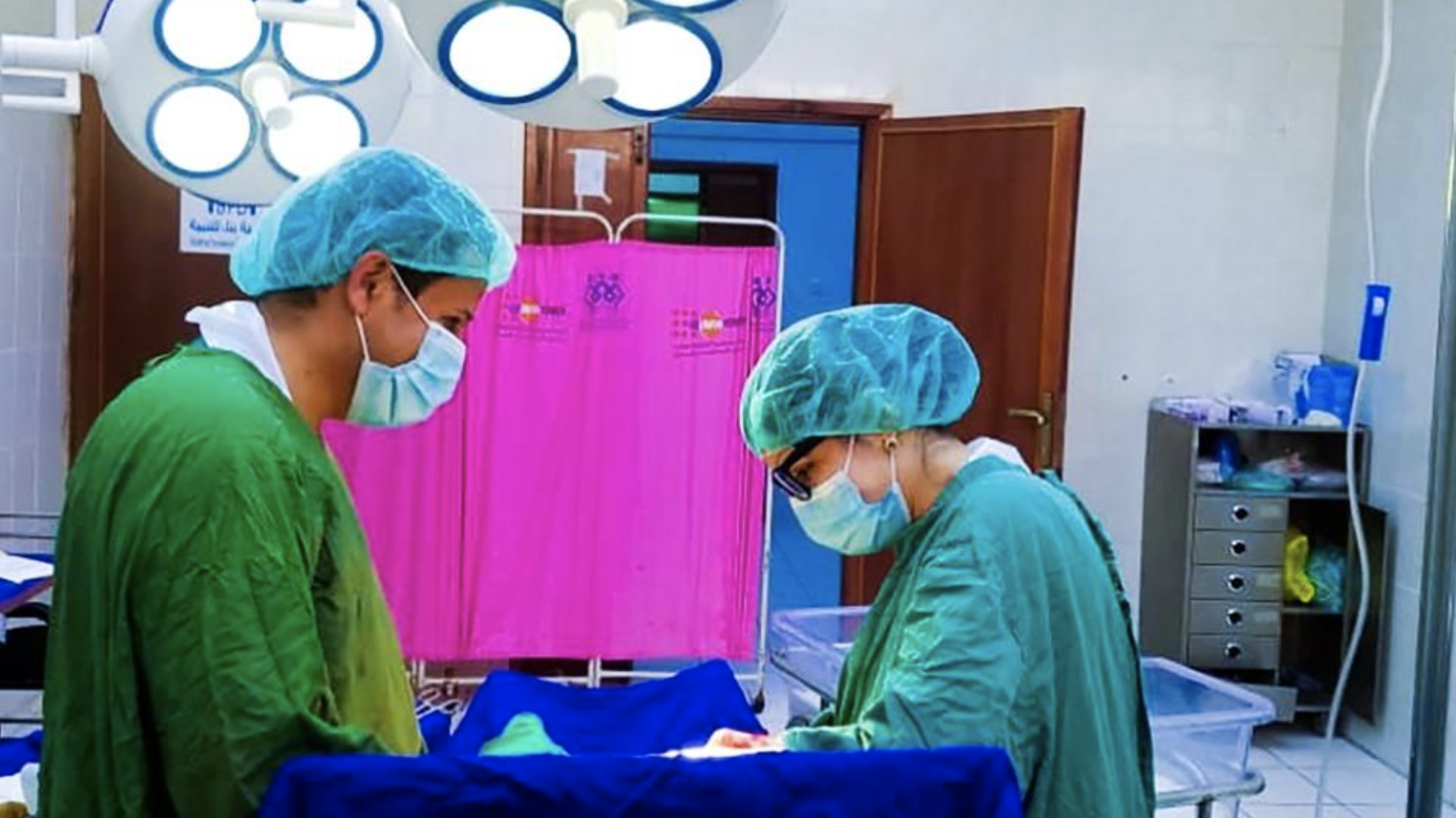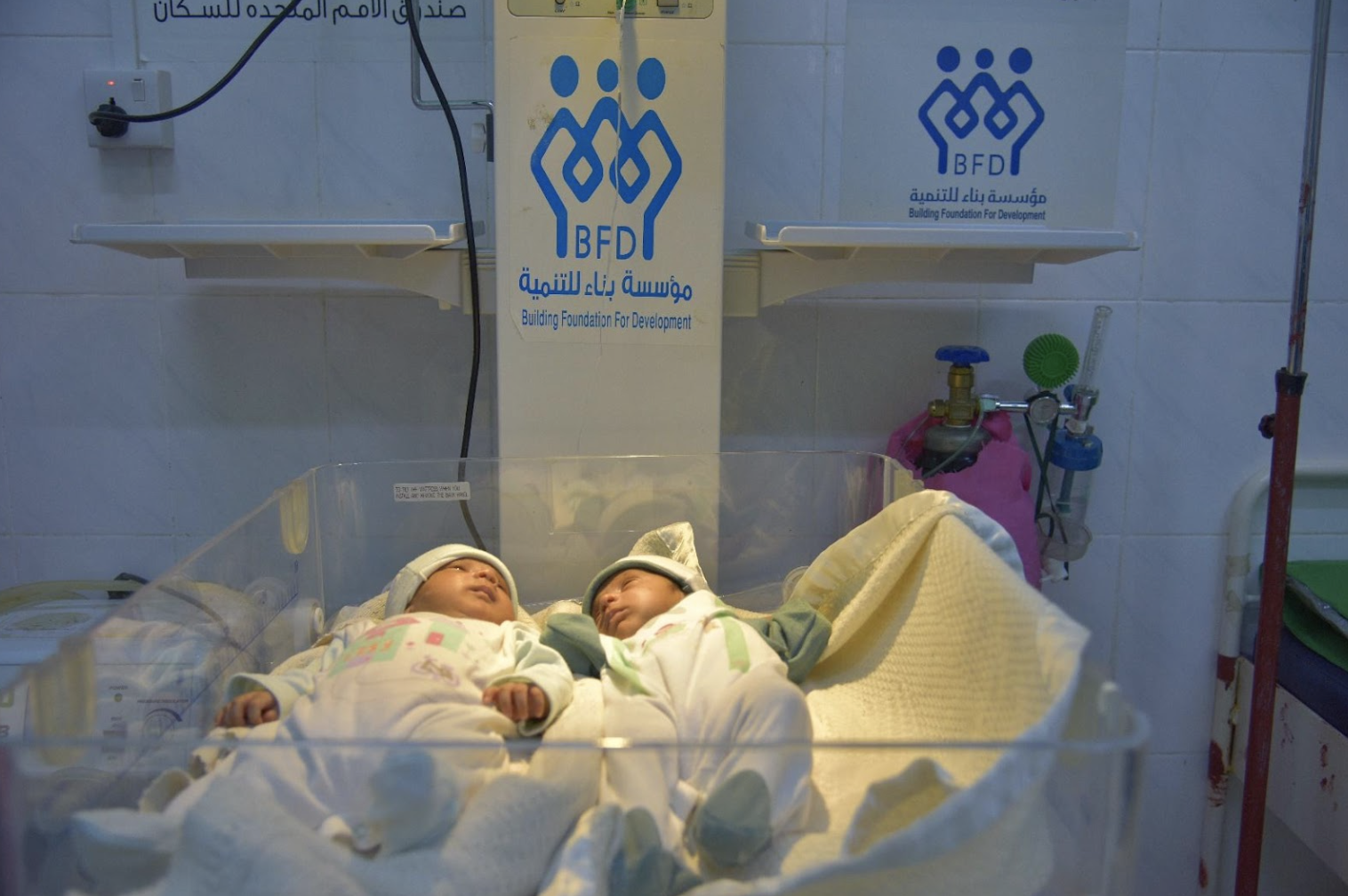Overview
Health care is an important area that has been largely neglected in emergency relief efforts, highlighting the need for a targeted response. The extent of health problems faced by people living in conflict-affected communities is of grave concern, with many having experienced a decline in overall health. This decline is owed largely to the poor living conditions of affected communities. Such health problems are further compounded by a severe lack of access to adequate and affordable healthcare services. The performance of maternal and child health services is significantly influenced by the provision and consumption of services and the efficient and effective use of the resources allocated therein. Safe access to the full suite of maternal and child health plays an important role in supporting women’s broader health and well-being. Therefore, BFD seeks to address some of these fundamental maternal and child health concerns by running emergency obstetric and newborn care.
BFD, funded by UNFPA, seeks to address the gaps in maternal and neonatal health by running the Emergency Obstetric and Newborn project as an emergency humanitarian response since October 2018. In 2022, the EmONC project was supporting 37 health facilities and four medical mobile teams with emergency reproductive health services to increase the availability of lifesaving reproductive health services in seven governorates; Al Hodeida, Hajjah, Al Jawf, Al Bayda, Al Mahwit, Dhamar, and M`arib in Yemen. Yet due to a shortage of funding, the number of supported health facilities and mobile teams has decreased to 27 facilities and two teams. The act of war and its societal consequences provide particular challenges in meeting the reproductive health requirements of the impacted population. Human life is lost significantly as a result of war and armed conflict. Through the mobile medical teams, integrated health and nutrition services are delivered to IDPs in campsites and host communities in remote areas.
The project provides emergency reproductive health services and supports targeted health facilities with medications, medical supplies, cleaning tools, printed materials as well as the supportive operational cost of fuels, water, and electrical maintenance for the targeted health facilities as needed. Moreover, the project supports health providers with monthly incentives to ensure that health facilities are adequately staffed and that provided services meet the quality-of-care standards and limit the risks of maternal and newborn morbidity and mortality. The number of reproductive health beneficiaries reached during 2022 from health facilities and mobile teams is 261,802; 120,137 of which have received antenatal care (ANC), 37,906 infants were delivered by skilled health staff, while 43,172 received postnatal care services (PNC), 60,587 received reproductive health counseling and family planning services (FP), and 100,347 beneficiaries received medical assistance through mobile teams.
Goals
- Participate in reducing maternal and neonatal morbidity and mortality by providing all essential obstetric emergency services in a manner that ensures access to safe motherhood services in targeted health facilities and surrounding tire zones, especially in the local communities that live in conflict and IDP areas.
- Contribute to saving the lives of mothers and newborns that are affected by complications of pregnancy, delivery, and postpartum.

Objectives
- To improve availability and coverage of RH services including prenatal care, skilled attended delivery, proper management of obstetric complications, and referral services.
- To increase access to quality safe motherhood services in targeted health facilities and surrounding time zones.
- To ensure the availability of lifesaving reproductive health medicines, supplies, and equipment in health facilities.
- To raise awareness among women and the community about the importance of obtaining safe motherhood services.
- To ensure qualified health personnel are in place to provide reproductive health services in the targeted health facilities.
Components of the Program
All programs provide basic and comprehensive emergency obstetric and neonatal services for mothers and newborns, including antenatal care, normal deliveries and cesarean section, postnatal care, and family planning and counseling.
1. Antenatal Care (ANC)
ANC aims to optimize maternal-fetal outcomes through regular pregnancy monitoring to ensure the best possible health status for the mother and fetus and early detection and management of complications of pregnancy.
2. Normal Deliveries & Cesarean Section
The project seeks to reduce maternal and neonatal morbidity and mortality by providing and encouraging safe childbirth in health facilities or delivery by a skilled attendance midwife to reduce the complications of childbirth.
3. Postnatal Care (PNC)
In postnatal care, healthcare workers provide care for infants and mothers through:
- Following up on the mother's medical status from early diagnosis and treatment of postpartum complications of mother and infant.
- Giving post-delivery advice to help initiation immediate breastfeeding.
- Counseling on maternal nutrition and immunization of the infant.
- Supporting the mother and her family in the transition to a new family constellation, and responding to their needs.
4. Family Planning and Counseling
The health worker provides the mother with the information she needs regarding family planning advice and recommends safe methods for family planning that fits with her health condition, age, and community consideration.
5. Operating the Health Facilities
Supports targeted health facilities with medications, medical supplies, cleaning tools, printed materials as well as the supportive operational cost of fuels, water, and electrical maintenance for the targeted health facilitaties, as needed.
6. Supporting Health Workers
During 2022, the project supported 708 health workers with monthly incentives, who ensure that the project services are available on 24/7 basis through qualified and skilled medical staff.
7. Distributing Reproductive Health Kits
Reproductive health kits are essential to provide safe reproductive health services and help alleviate beneficiaries' suffering.
8. Providing Referral Services
The referral system has effectively linked the primary level of maternal healthcare with the proper secondary level care when necessary. The referral system is one of our strategy to assist in ameliorating this growing issue in Yemen.
9. Monitoring and Evaluation (M&E)
Regular field supervision, monitoring & evaluation for project activities.
10. Capacity Building For Health Workers in EmONC Project
The training aims to improve provider performance and sustainable national capacity to provide safe, respectful, and friendly care to women, newborn infants, and their families. It encourages mothers and families to use the healthcare system confidently, such as IPC, a response mechanism to provide reproductive health services during COVID-19, a referral mechanism, documentation, a mechanism of sispensing medicine, neonatal resuscitation, and quality of data.
11. Responding to Covid-19 in EmONC Project
In response to the COVID-19 pandemic, medical equipment and PPE materials were distributed to cover the need of all healthcare workers in all targeted health facilities.

You can read more about BDF's Reproductive Health Program and its activities here.